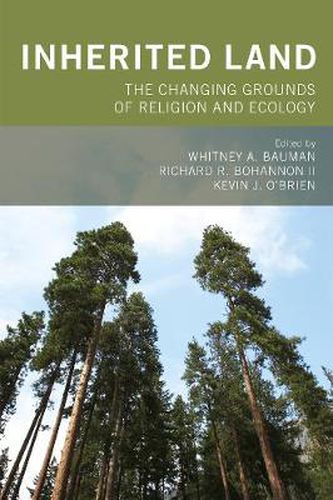Readings Newsletter
Become a Readings Member to make your shopping experience even easier.
Sign in or sign up for free!
You’re not far away from qualifying for FREE standard shipping within Australia
You’ve qualified for FREE standard shipping within Australia
The cart is loading…






This title is printed to order. This book may have been self-published. If so, we cannot guarantee the quality of the content. In the main most books will have gone through the editing process however some may not. We therefore suggest that you be aware of this before ordering this book. If in doubt check either the author or publisher’s details as we are unable to accept any returns unless they are faulty. Please contact us if you have any questions.
Religion and ecology has arrived. What was once a niche interest for a few academics concerned with environmental issues and a few environmentalists interested in religion has become an established academic field with classic texts, graduate programs, regular meetings at academic conferences, and growing interest from other academics and the mass media. Theologians, ethicists, sociologists, and other scholars are engaged in a broad dialogue about the ways religious studies can help understand and address environmental problems, including the sorts of methodological, terminological, and substantive debates that characterize any academic discourse. This book recognizes the field that has taken shape, reflects on the ways it is changing, and anticipates its development in the future. The essays offer analyses and reflections from emerging scholars of religion and ecology, each addressing her or his own specialty in light of two questions: (1) What have we inherited from the work that has come before us? and (2) What inquiries, concerns, and conversation partners should be central to the next generation of scholarship? The aim of this volume is not to lay out a single and clear path forward for the field. Rather, the authors critically reflect on the field from within, outline some of the major issues we face in the academy, and offer perspectives that will nurture continued dialogue.
$9.00 standard shipping within Australia
FREE standard shipping within Australia for orders over $100.00
Express & International shipping calculated at checkout
This title is printed to order. This book may have been self-published. If so, we cannot guarantee the quality of the content. In the main most books will have gone through the editing process however some may not. We therefore suggest that you be aware of this before ordering this book. If in doubt check either the author or publisher’s details as we are unable to accept any returns unless they are faulty. Please contact us if you have any questions.
Religion and ecology has arrived. What was once a niche interest for a few academics concerned with environmental issues and a few environmentalists interested in religion has become an established academic field with classic texts, graduate programs, regular meetings at academic conferences, and growing interest from other academics and the mass media. Theologians, ethicists, sociologists, and other scholars are engaged in a broad dialogue about the ways religious studies can help understand and address environmental problems, including the sorts of methodological, terminological, and substantive debates that characterize any academic discourse. This book recognizes the field that has taken shape, reflects on the ways it is changing, and anticipates its development in the future. The essays offer analyses and reflections from emerging scholars of religion and ecology, each addressing her or his own specialty in light of two questions: (1) What have we inherited from the work that has come before us? and (2) What inquiries, concerns, and conversation partners should be central to the next generation of scholarship? The aim of this volume is not to lay out a single and clear path forward for the field. Rather, the authors critically reflect on the field from within, outline some of the major issues we face in the academy, and offer perspectives that will nurture continued dialogue.